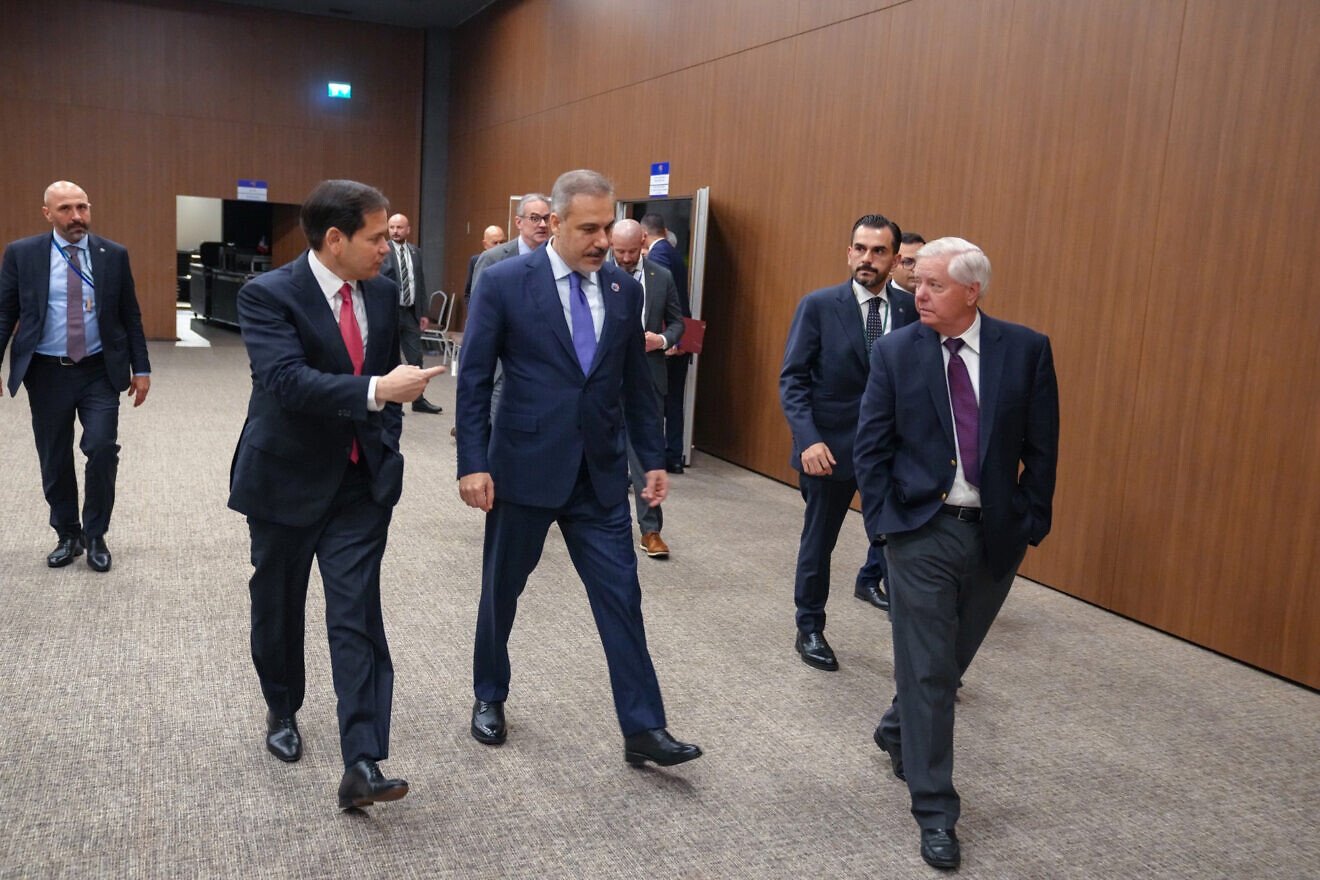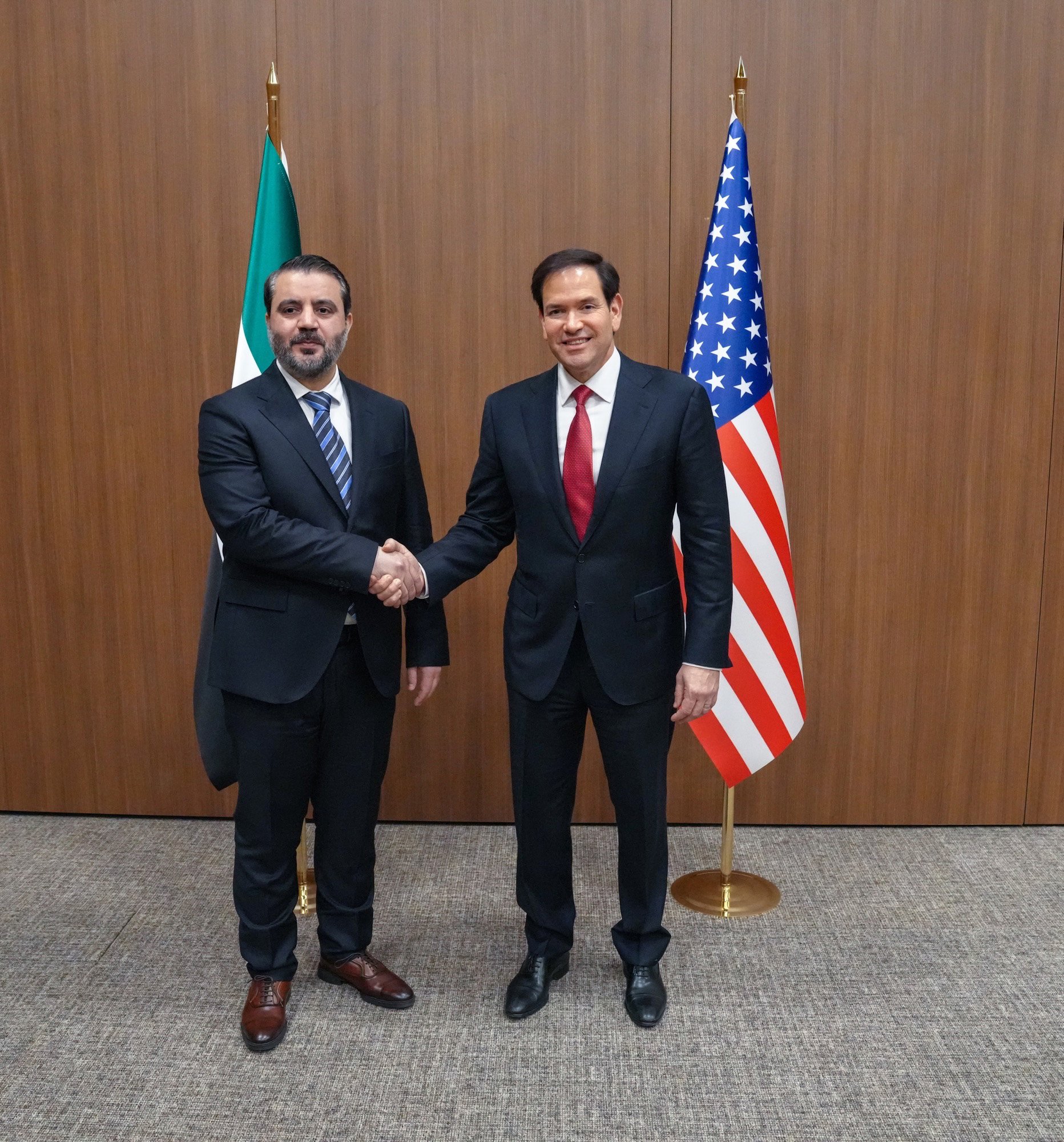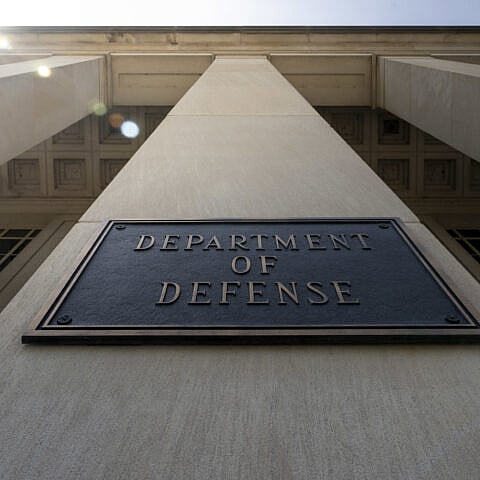by Mike Wagenheim
With Iran on its back foot, “it’s a moment that requires everybody to step back and say let’s give peace a chance,” a senior Trump admin official said.
 |
U.S. Secretary of State Marco Rubio holds an
engagement with Syrian Foreign Minister Asaad Hassan al-Shibani, Turkish
Foreign Minister Hakan Fidan and Sen. Lindsey Graham (R-S.C.) in
Antalya, Turkey, May 15, 2025. Credit: Freddie Everett/U.S. State
Department. |
U.S. President Donald Trump issued an executive order on Monday removing longstanding sanctions on the Syrian government while maintaining sanctions on the regime of deposed Syrian President Bashar Assad and other destabilizing actors.
The executive order ends the national emergency that the U.S. government declared in 2004 under Executive Order 13338 and revokes the five orders that constitute the basis of that program, according to a senior Trump administration official, who spoke to reporters on background.
The executive order also directs “certain actions with respect to waivers of applicable statutory-based sanctions, export controls and other restrictions,” the official said.
The order essentially eases sanctions on certain parts of the Syrian government, including state-owned entities, such as the central bank.
Congress alone can repeal the sanctions package, which passed under the Caesar Syria Civilian Protection Act of 2019, but Trump issued waivers for some of the elements earlier this year and intends to explore mechanisms to suspend them under his executive order on Monday.
Some of the sanctions impacted by Monday’s action date as far back as 1979.
“Today’s action will help provide the opportunity to reconnect Syria’s economy with global commerce and rebuild the country’s infrastructure,” stated Scott Bessent, the U.S. treasury secretary. “The Syrian government must continue to take steps towards building a stable, unified country that is at peace with itself and its neighbors. It is my hope that the actions taken by the United States will not only provide much-needed relief for the Syrian people, but also give the country a chance to succeed.”
“I’m unbelievably hopeful,” Thomas Barrack, U.S. special envoy to Syria and ambassador to Turkey, told reporters. “None of this happens by itself.”
“You see what’s happening with Israel and Iran. That’s a window,” he said. “That window has never existed, so when we talk about diplomacy, what you can do in Syria, what you can do in Lebanon, what you can do in Iraq, it’s an opportunity that we have never ever seen.”
Rather than taking gradual steps to reduce sanctions, Trump opted to suspend them more fully, according to U.S. officials.
“The bottom line is it doesn’t work” to gradually withdraw sanctions and monitor the progress, a second senior Trump administration official told reporters on background.
“We have consistently said we’re not nation-building, and the conditions that we impose on any government is another string that only causes frustration,” the second official said.
Syrian President Ahmed Al-Sharaa, who remains a U.S.-designated terrorist, “has said that he has no resentment or hostility to Israel in any regard and is looking forward to starting conversations, which have been reported to have happened on a back channel basis,” according to the second U.S. official.
‘What we have to do is build trust’

The way to entice Syria to normalize relations with Israel, the second official said, is to “make it fruitful for them on an economic basis, on a civilization basis, on a peace and prosperity basis, and that’s all coming together.”
“Throughout history, Syria was a key center on the Silk Road and a hub for global trade, multiculturalism and entrepreneurship,” Brad Smith, acting under secretary for terrorism and financial intelligence at the U.S. Treasury Department, told reporters.
“Today’s actions will end the country’s isolation from the international financial system for global commerce in the region, as well as from the United States,” he said.
The second administration official addressed whether the longstanding dispute over possession of the Golan Heights along the Israel-Syria border was a topic discussed during the sanctions easement or a potential impediment to a deal between Israel and Syria.
“The lines that were drawn in 1948 and 1926 and 1967 and 1974 are all illusions,” the senior U.S. official said. “It’s men drawing lines for each other based on the fact that they were there.”
The present moment “has to end all of those kinds of discussions and say, ‘Look, let’s come to a practical cessation of hostilities,’” the official said.
The official suggested the model of the Israel-Egypt peace treaty. Jerusalem and Cairo said, “Why don’t we stop fighting about what the line is, and let’s talk about how we coexist,” according to the official.
“What we have to do is build trust. We just have to build trust day by day,” the official said.
The issue isn’t about a particular border but about who is threatening whom and facing off over that line, according to the Trump administration official.
“That’s the issue because it doesn’t matter what the line is,” the official said. “If you don’t trust each other on the other side of the line, it’s going to continue forever.”
A portion of the executive order contains provisions that will ensure that sanctions remain on “Assad, his cronies and other destabilizing regional actors, including terrorists, as well as those that proliferate weapons of mass destruction, in addition to counter-narcotics, specifically Captagon-related proliferation,” according to the first U.S. official.
The order does so by expanding an existing national emergency declared by Executive Order 13894. The U.S. Treasury will rely upon that authority as needed “to ensure that sanctions remain on those regionally destabilizing actors like Assad, his inner circle and human rights abusers,” the official said.
“While we remain hopeful for the country’s future and its new government, we are also clear-eyed that threats to peace remain,” Smith told reporters. “The United States will remain ever vigilant where our interests and security are threatened, and Treasury will not hesitate to use our authority to protect us and international financial systems.”
“It’s a moment that requires everybody to step back and say, ‘Let’s give peace a chance,’” the second official said.
Mike Wagenheim
Source: https://www.jns.org/trump-orders-end-of-sanctions-on-syrian-government-institutions/



No comments:
Post a Comment